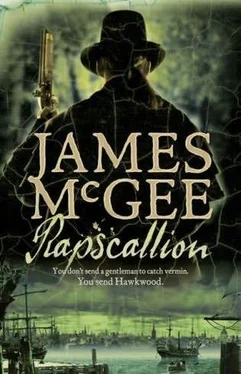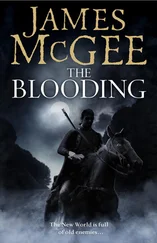James McGee - Rapscallion
Здесь есть возможность читать онлайн «James McGee - Rapscallion» — ознакомительный отрывок электронной книги совершенно бесплатно, а после прочтения отрывка купить полную версию. В некоторых случаях можно слушать аудио, скачать через торрент в формате fb2 и присутствует краткое содержание. Жанр: Исторический детектив, на английском языке. Описание произведения, (предисловие) а так же отзывы посетителей доступны на портале библиотеки ЛибКат.
- Название:Rapscallion
- Автор:
- Жанр:
- Год:неизвестен
- ISBN:нет данных
- Рейтинг книги:3 / 5. Голосов: 1
-
Избранное:Добавить в избранное
- Отзывы:
-
Ваша оценка:
- 60
- 1
- 2
- 3
- 4
- 5
Rapscallion: краткое содержание, описание и аннотация
Предлагаем к чтению аннотацию, описание, краткое содержание или предисловие (зависит от того, что написал сам автор книги «Rapscallion»). Если вы не нашли необходимую информацию о книге — напишите в комментариях, мы постараемся отыскать её.
Rapscallion — читать онлайн ознакомительный отрывок
Ниже представлен текст книги, разбитый по страницам. Система сохранения места последней прочитанной страницы, позволяет с удобством читать онлайн бесплатно книгу «Rapscallion», без необходимости каждый раз заново искать на чём Вы остановились. Поставьте закладку, и сможете в любой момент перейти на страницу, на которой закончили чтение.
Интервал:
Закладка:
When he wasn't labouring in a work party or talking with Hawkwood or Fouchet, or sometimes with the boy, Lasseur spent most of his time pacing the deck and gazing restlessly across the estuary, locked within his own thoughts. With so many bodies crammed in one place, physical solitude was but a dream. Hawkwood knew there wasn't a man on board who wouldn't try and seek solace in the privacy of his own mind. He sought it himself when he could, and took advantage of the opportunities it offered to observe shipboard routine at close quarters. And in the course of his observations Hawkwood had seen enough to know that making a successful escape from the hulk looked well nigh impossible. Moored a stone's throw from the middle of a busy estuary; surrounded by inhospitable marshland; heavily guarded by its contingent of militia and a commander who was fully prepared to use deadly force against the slightest infraction, the ship was too well sealed.
According to Ludd's reckoning, four men had made it off the hulk in recent weeks. In the short time he'd been on board, Hawkwood had yet to uncover a single clue as to how they might have done it. He'd tried to pin Fouchet and the others down, but to his frustration they had been of no more help than Lieutenant Murat.
With the exception of those who'd retreated into their own little world and the denizens of the orlop deck, most of the prisoners seemed content to co-exist in small social groups centred round their messes. Many would probably have no idea there'd been an escape, let alone have any knowledge of how it had been accomplished; their first inkling that something untoward had taken place would come with the increased activity of the hulk's commander and his crew, and the heavy-handed actions of the guards as they inspected and emptied the deck to take an unexpected body count. Someone as well informed as Fouchet would know more, but the teacher was too cautious to discuss such matters with a new arrival, particularly in the light of Murat's reference to informers. Hawkwood had operated clandestinely before and, though patience did not come easily to him, he'd learned that a subtle approach would achieve better results than barging around asking too many pertinent questions.
Ludd's suspicion that there was organization behind the escapes had been confirmed by Murat. Yet Hawkwood was still no wiser as to who was behind it. He wondered how long it would be before the translator got back to them. A week? Two? Or would it be a month? Or longer? The thought made his blood run cold. His rendezvous with Ludd was in three days. Would he have anything positive to report? It didn't seem likely. Unless a man could change himself into something the size of a rat and slip between the grilles like Hawkwood's scaly-tailed friend the other night, the only way off the hulk seemed to be as a corpse wrapped inside a burial cloth. Even then you wouldn't get very far.
There had been seven deaths in the time Hawkwood had been aboard. The cause was marsh fever. During the summer months the fever claimed many victims among the weak and undernourished. Age was an inevitable contributing factor, though in the close-knit squalor of a prison ship, fever, typhus, pox and depression showed no favouritism. Two of the dead men had been in their twenties.
There had been no ceremony in the removal of the deceased. Wrapped in filthy sacks of hastily sewn sailcloth, the corpses had been lowered into a waiting boat using a winch and net. Then, accompanied by a burial detail of prisoners and a quartet of militia, the sorry cargo had been rowed to a bank of shingle half a mile off the hulk's stern. Hawkwood and Lasseur had watched in sombre silence as the bodies had been carried up the foreshore and thrown into a pit dug at the back of the beach. From what they'd been able to see, no words were spoken over the burial before the boat made its return journey.
What had been noticeable to Hawkwood was that, aside from himself, Lasseur and a few of the newer prisoners, no one had taken any interest in the proceedings. On Rapacious, death and burial were commonplace.
Mid-afternoon of his fifth day on the hulk, Hawkwood was leaning on the forecastle rail, taking a rest after three hours spent hauling barrels of dried herring and sacks of onions on board. The work had been hard, but there had been a sense of purpose to the task, and, more importantly, it had made the time pass quicker. Now the sun was warm on his back and the estuary was calm. If he closed his eyes and nostrils, a man could, for a moment or two, imagine he was a thousand miles away.
Lasseur was standing next to him. The privateer captain had pulled the cheroot out of his jacket for what must have been the hundredth time and was staring at it with all the concentration of a drunkard eyeing a bottle of grog.
Hawkwood sensed a presence at his shoulder.
It was the teacher, Fouchet, his face frozen in an expression that struck Hawkwood with a sense of impending dread.
"Sebastien?" Lasseur enquired cautiously.
Fouchet stared at them, as if he didn't know where to begin. Sorrow exuded from every pore.
"Sebastien?" Lasseur said again.
The teacher's face crumpled. "They've taken the boy."
Hawkwood frowned. "Who have? The guards?"
Fouchet shook his head. "The Romans."
Lasseur gasped in shock, his cheroot forgotten. "What? How?"
"I sent him to the galley after his lessons to help Samuel prepare for supper. He didn't arrive. I only found that out when I went to sort out the rations for the mess." The teacher began to wring his hands. "I should have gone with him. It's my fault."
At Lasseur's request, Fouchet had secured the boy a job as assistant to one of the galley cooks.
"How do you know the Romans have him?" Hawkwood said. "He could be with one of the other boys."
The dwellers from the orlop had kept a low profile since their lightning raid on the Park — collectively, at any rate. Individually, they still made forays on to the forecastle in search of galley scrapings or the chance to barter, though they were usually given short shrift by the non-Roman captives. En masse, however, their presence on board, only a deck below, continued to cast a dark shadow in the minds of all the other prisoners. They reminded Hawkwood of the untouchables he'd seen in India: hated and feared, but impossible to ignore.
Fouchet shook his head. "I spoke with Millet and Charbonneau. They asked around. Lucien was seen with Juvert."
"Who's Juvert?" Hawkwood asked.
"I know him," Lasseur said quickly. "Damned pederast! I caught him talking to Lucien on the first day. I warned him to leave the boy alone."
Hawkwood's mind went back to the prisoner he'd seen crouched beside the boy, slender fingers caressing Lucien's back. "He's a Roman?"
"He's one of Matisse's acolytes," Fouchet said.
"Matisse?"
"A vile creature; calls himself king of the Romans. He rules the lower levels. A Corsican, too, if you can believe that," the teacher added sourly.
"There's a leader?" Lasseur couldn't hide his disbelief.
"What about the guards?" Hawkwood asked, wondering why Matisse had adopted the title of king. The Romans of old had been ruled by an emperor, hadn't they? Though on second thoughts, one Corsican emperor at a time was probably enough.
His mind went back to the comment he'd overheard between the two militia men when he'd arrived on board:
Wait till His Majesty gets a look at that!
A sick feeling began to worm its way into Hawkwood's stomach.
Fouchet shook his head. "They'll do nothing. No crime has been committed. In any case, they won't dare to venture that far below deck."
Hawkwood stared hard at the teacher. "It's a British ship! You're telling me the British Navy has no rights on one of its own vessels?"
Fouchet spread his hands. "It has the right. It's the will that's lacking, especially where the Romans are concerned. If you want the truth, I think the commander and his men are more wary of Matisse and his courtiers than we are."
Читать дальшеИнтервал:
Закладка:
Похожие книги на «Rapscallion»
Представляем Вашему вниманию похожие книги на «Rapscallion» списком для выбора. Мы отобрали схожую по названию и смыслу литературу в надежде предоставить читателям больше вариантов отыскать новые, интересные, ещё непрочитанные произведения.
Обсуждение, отзывы о книге «Rapscallion» и просто собственные мнения читателей. Оставьте ваши комментарии, напишите, что Вы думаете о произведении, его смысле или главных героях. Укажите что конкретно понравилось, а что нет, и почему Вы так считаете.












